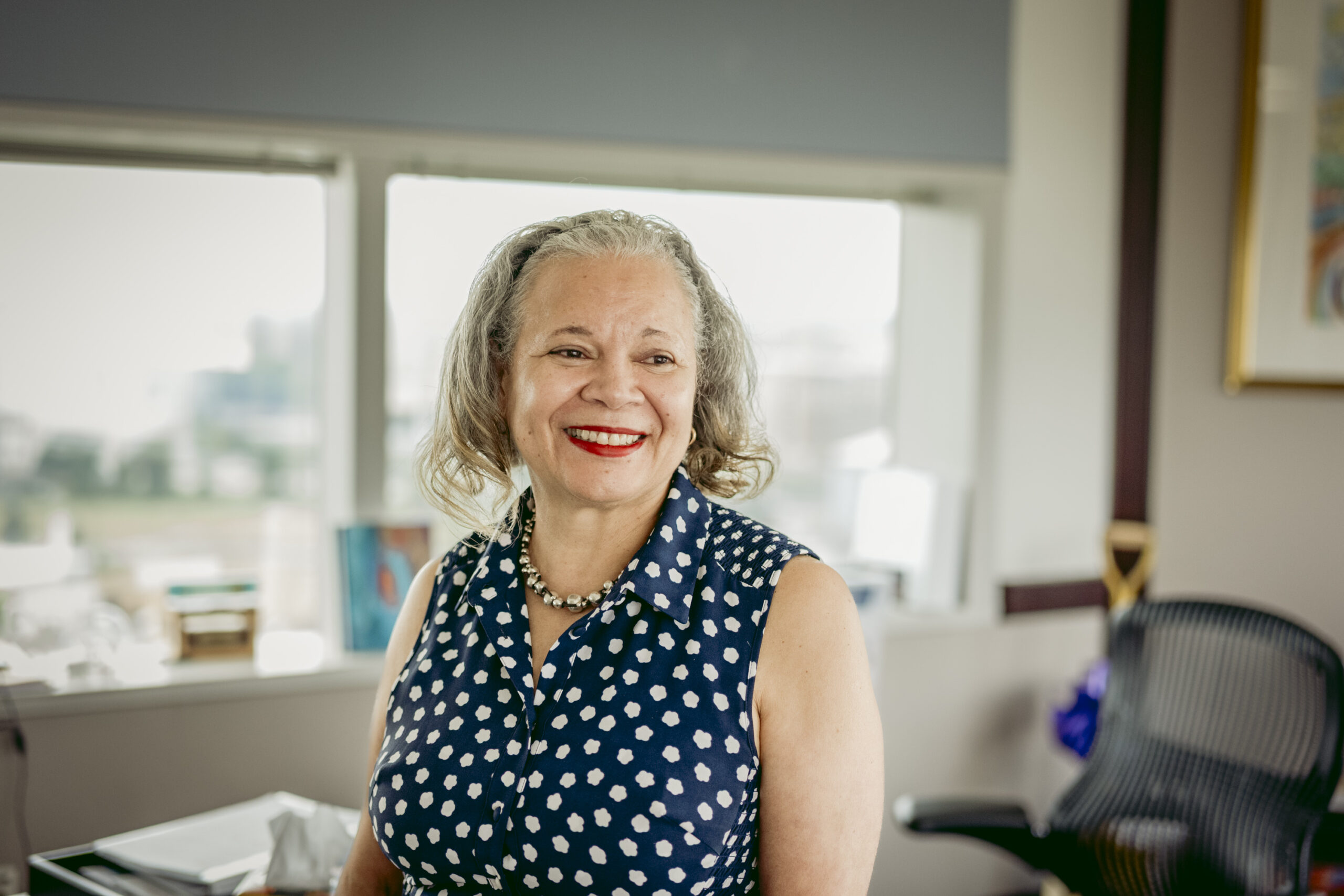This article is co-published with The Assembly.
Vi Lyles picked up her phone last week to check on James Ferguson, someone who always checked on her.
Fergie, as his friends call him, was a courageous civil rights attorney who helped desegregate schools, secured pardons for the Wilmington Ten, and freed a Winston-Salem man who was wrongfully imprisoned for two decades.
He’d also been a mentor and friend to Lyles for decades. He gave the eulogy at her first husband’s funeral in 1989 and encouraged her to run for office in 2013, even as her second husband was dying of cancer.
Knowing Ferguson, 82, had been sick for months, she called his son Jay.
“Jay, I’ve been thinking about your dad,” Lyles told him. “And I just wondered if I could come over and see him.”
She was too late, Jay said. Ferguson had died at 4:45 that morning.
I met with Lyles the following day in her 15th-floor office, and after a few minutes of small talk about all the golden shovels in the corner, she brought up Fergie as tears filled her eyes.
“When I first ran [for mayor], he said, ‘You’re going to win. You’re going to be OK. This is going to work,’” she said. “Of course, you doubt yourself a lot of times, but he was always there for me.”
It’s been an emotional summer for Charlotte’s mayor. She helped secure a long-sought transportation victory in the state legislature. She’s been on stage to celebrate the opening of a new medical school and research campus and to announce that the city will host the 2026 Major League Soccer All-Star Game. But she’s also faced mounting pressure over controversies on city council, the city’s response to a burst of gun violence over July 4 weekend, and what some describe as a top-down leadership style that freezes out dissent.
During the course of our 80-minute conversation, she repeated the lessons of her mentors, from Ferguson to former Mayor Harvey Gantt. The latter urged her to look past the troubles of the moment and to remember that, “There’s lots of things you can do, but what do you really want to achieve?”
The advice is adjacent to the tenets of what was known as The Charlotte Way, a philosophy that the generation of leaders who preceded her used to accomplish big-picture goals through collaboration between business, local government, and philanthropy.
Lyles, 72, has worked for the city of Charlotte in some capacity for the better part of 40 years, across eight different mayors. Intentionally or not, she’s led the resurgence of that Charlotte Way over the past few years. She works the phones constantly, leaning into her decades of relationships. She’s close with City Manager Marcus Jones, and their partnership has helped generate numerous splashy announcements, from corporate relocations to investments in professional sports.
In a strong-manager system of government where the mayor is part-time, Lyles has become one of the most powerful politicians in the city’s history. She’s done so quietly, with very few big speeches or memorable media moments. She doesn’t fire off zinger quotes like her colleagues; she brought a page of notes to our interview and read from it at times. But this careful, moderate style has endeared her to an influential executive crowd that values partnership and progress over politics. Her campaign filings list four-figure donations from university presidents and CEOs, in part because of her ability to balance their ambitions with the political realities of the moment.
She’s also a rare Democrat who’s found common ground with local and statewide Republicans through the transportation referendum, which would fund rail, road, and bus projects with an increase in the sales tax. When I wrote a story about how the referendum came together, most people I talked to praised her, from the lobbyists to the conservative town manager of Mint Hill.
But her style frustrates others. Some council members and local officials believe that by the time ideas come to the dais, they’re “already baked.” (Multiple people I talked to over the past few weeks used that phrase.)
And grassroots opposition is bubbling. It’s not necessarily targeting Lyles, but more about how the city operates. The Charlotte Way has its detractors. Activists argue for more inclusion. Journalists bang the transparency drum. Liberals want bolder, faster change. Conservatives and neighborhood groups rail over crime. The question for Charlotte, and for Lyles, over the next few election cycles then becomes: Is The Charlotte Way 2.0 a hot air balloon to the future, or one that will burst again?
“I get emails like crazy,” she said. “Some of them don’t sign their names. Some of them are mad at me for whatever I’ve done, and then others [say], ‘Thank you so much.’ I think the job that I have is to always be as positive as possible, so that we can do the things that we believe in. … I think you have to look at the long range. It’s the long game.”

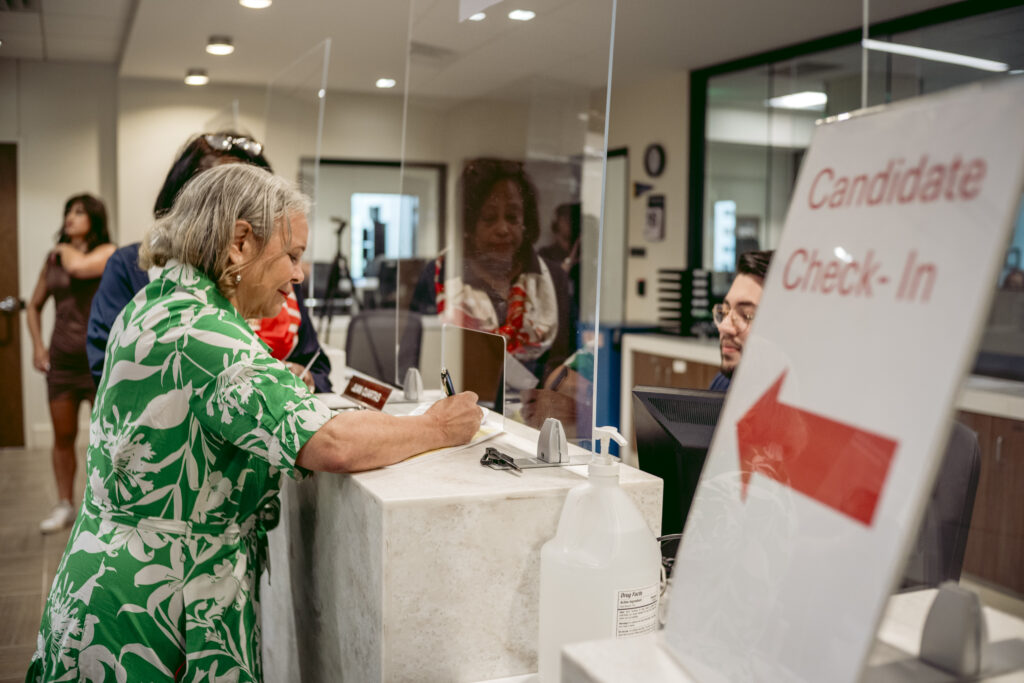
The main question I hoped Lyles would answer is one that came up constantly in conversations about her over the past few weeks: Why run again?
If she wins re-election, she’d become Charlotte’s second-longest serving mayor, behind only Pat McCrory. She’s also a grandmother, with two grandkids in Charlotte and two others in Washington, D.C. Moreover, she’s already navigated some of the city’s most challenging stretches. She was elected the year after Charlotte’s difficult 2016, when the state legislature’s “bathroom bill” led to an economic upheaval, and the police shooting of a Black man named Keith Scott led to a week of protests and discontent.
She immediately set out to mend fences across party lines, even going to Washington in March 2018 to visit President Donald Trump. She brought the 2020 Republican National Convention here over a chorus of opposition from constituents and council members. She made it through the pandemic—and the awkwardness of trying to run video conference meetings with 11 council members talking over each other.
She helped launch the $250 million Mayor’s Racial Equity Initiative campaign, landed an MLS franchise in 2019, and whipped up enough votes last year for $650 million in controversial renovations to the Carolina Panthers’ football stadium. And now, she’ll see the transportation plan she’s craved during her entire tenure make it to the ballot.
In a city that takes pride in growth, she’s had quite a run. Last week, The Charlotte Ledger noted that the region’s population surge is actually happening much faster than previously thought—bringing in an average of more than 150 new residents per day, up from last year’s widely circulated number of 117.
So, why sign up for more? More emails. More criticism. More long Monday nights at council meetings.
She gave a rehearsed answer at first—There’s more work to do. She says she’s focused on making sure Charlotte has jobs of all income levels, so people have a path to living comfortably here. But when I pressed, it was clearly more complicated.
She does think about her legacy. She wants to see the transportation initiative pass. She told me she’s envisioned herself at the grand opening of one of the transit lines, much like when former mayors gathered around McCrory in 2007 for the Blue Line’s debut. “Harvey was there,” she said. “Sue Myrick was there. Richard Vinroot was there. That’s a pretty good lineup. Yeah, maybe one day, I’ll get to be in a lineup like that.”
But her reason for running goes even deeper than legacy. She’s worked in city government for most of her adult life, as a budget analyst, assistant city manager, at-large council member, and now mayor. She knows nothing other than being surrounded by conversations about the future of Charlotte.
She remembered what her second husband, John Lyles, said to her when he went into hospice care in 2013: “Vi, you cannot stay in this house. You know, that’s not your thing.”

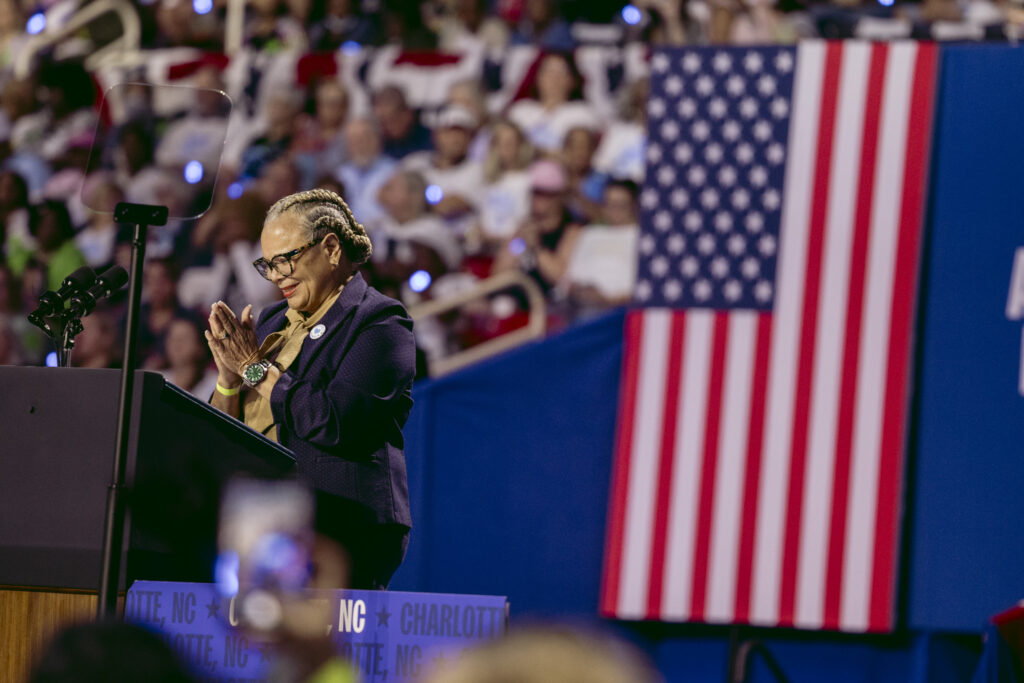
Lyles left her hometown of Columbia, S.C., in the late 1960s to attend Queens College, then an all-women’s school, just one year after it integrated in affluent southeast Charlotte. At a mixer between Queens and Davidson College, Davidson didn’t have enough Black men to pair with the Black women, so the organizers set her up to dance with a “liberal white guy.” She’s still friends with him today, but it was awkward and demeaning in the moment, she remembers.
There were a number of such instances during her first year, so one day she boarded a bus back to Columbia.
Her family lived on a street where “you were expected to excel,” she said. Her dad owned a construction company. Down the street was a dentist. Next door was a civil rights attorney who, as it happens, represented Gantt when he integrated Clemson in the 1960s. But when she arrived home and said she didn’t want to go back to Queens, her mother gave her marching orders.
“She said to me, very clearly, ‘We don’t quit,’” Lyles told me. “And I got right back on that Greyhound bus and came back to Charlotte.”
She finished Queens early, then went to the University of North Carolina at Chapel Hill for graduate school. After a short stint working with the state’s Department of Justice in Raleigh, she returned to Charlotte, where she landed a job with the city as a budget analyst.
Her first husband, Wayne Alexander, was from a prominent family on the west side. He was an accomplished lawyer who’d been an assistant U.S. attorney. But he struggled with mental health and, on December 20, 1989, he died by suicide. Their kids were just 10 and 7.
“It was Christmas,” Lyles said, looking down. “Packages were wrapped.”
She enrolled her kids in a nonprofit program that helped children who’d suffered loss. And soon she started making her way out into the community again. Her network became her armor. She joined the Junior League and became a board member for local foundations. In 1996, she had two big events: She got remarried and was promoted to assistant city manager. One holiday season, she received an invitation to attend a Christmas party thrown by former Bank of America CEO Hugh McColl.
I asked her what that was like, to be a single mom, and then a remarried mom, trying to build connections.
“I was steeling myself,” she said of each event. “I would stand outside and think, ‘Where am I going to go? Who am I going to speak with? What am I going to say?’”
She retired from the city in 2004, around the time she learned she had breast cancer. After going through treatment, she started a consulting firm and later took a position with the Lee Institute, an organization that connects nonprofits, and worked to bring football to UNC Charlotte.
In 2013, at John’s urging, she launched her bid for an at-large city council seat. She finished second in the Democratic primary on September 10, qualifying for the general election. That same day, John died.
She was elected to council a few weeks later. The job became her outlet.

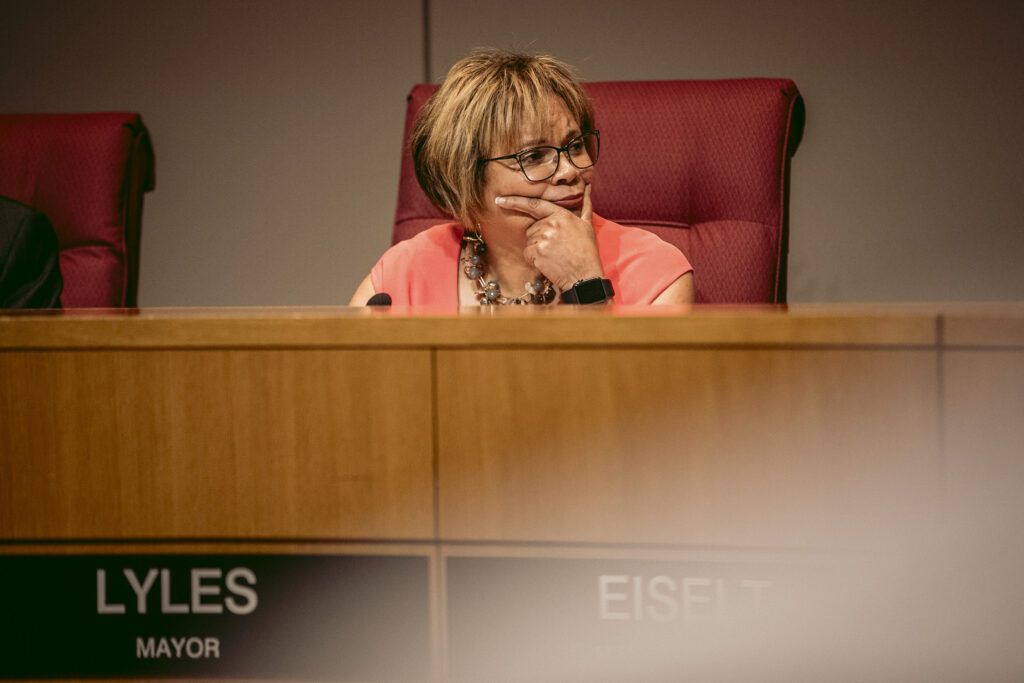
On council, Lyles carved out a role as a quiet maneuverer more comfortable working behind the scenes. In 2015, Charlotte elected Mayor Jennifer Roberts, who was very much the opposite of that.
In February 2016, Lyles voted in favor of a nondiscrimination ordinance that would have allowed people to use the bathroom of their choice in public spaces. The legislature retaliated a month later with HB2, overriding the ordinance and making North Carolina a punchline in national late-night jokes. Several concerts and conventions, including the NBA All-Star Game, backed out of bringing business here.
Roberts, in part because of her public persona, became the target of harassment and death threats. But city council members went largely unnoticed.
Then, in September of that year, police officers encountered Keith Scott sitting in his vehicle in north Charlotte. They say he had a blunt and a gun, and asked him to get out of his car. When he failed to respond to their requests to drop the gun, one officer shot and killed him. The incident set off a week’s worth of protests that generated national news and shut down uptown for a day.
The demonstrations caused many of the people who built Charlotte to reconsider who they’d left behind as the city grew. And it also led to an overhaul of council the following year, with Lyles taking the mayor’s seat and a wave of millennials winning council races.
JD Mazuera Arias turned 18 during that tumultuous 2016. Now he’s 27, and he’s running to unseat two-term council member Marjorie Molina on Charlotte’s east side.
Born in Colombia, he immigrated with his parents at 8 months old. He grew up in east Charlotte schools, graduated from East Mecklenburg High School, and attended Queens on a scholarship.
Mazuera Arias says there’s a growing frustration with city government at the neighborhood level, particularly in the east Charlotte district he hopes to represent. He was quick to bring up Lyles casting a tiebreaking vote in a recent meeting to prevent council from studying the working conditions and pay for employees at Charlotte Douglas International Airport.
“There’s no doubt the mayor played an important role in the city’s history as a civil rights leader and trailblazer, and we have to acknowledge that,” he said. “But we have to also acknowledge that [other] voices are growing. What I’m hearing is, they want housing they can afford. They want inclusion in whatever the transit plan is bringing.”
He’s been endorsed by former mayor Roberts, who also explored challenging Lyles but ultimately decided against it. I talked to Roberts at length this month about why she considered it.
“Regular community folks feel powerless,” she said.
Lyles will face primary challenges from Jaraun (Gemini) Boyd, a community activist, along with Delter Kenny Guin III, Brendan K. Maginnis, and Tigress Sydney Acute McDaniel. Boyd probably has the most name recognition, but even he’s a long shot.
Lyles acknowledges that she is running at another turbulent time. Charlotte is not New York, where Democratic Socialist Zohran Mamdani has created a media frenzy after winning the mayoral primary. But she knows people have reasons for wanting to rise up, to protest, to disturb the status quo.
On the day we met, Lyles had spent her morning with a preschool program that was in danger of losing federal funding, connecting it with business leaders who might be able to keep it afloat. Then she met with a woman who’d been laid off from her job at another education nonprofit.
“People are worried,” Lyles said. “They’re worried about Social Security. They’re worried about whether or not the schools are going to be around. They’re worried about citizenship. They’re worried about people coming in and snatching them away.”


At-large council member Dimple Ajmera, who was elected in the same 2017 wave that Lyles rode, spent her first couple of years clashing with Lyles over higher-profile votes.
Lyles initially put Ajmera in charge of the council’s environmental committee. But then Ajmera voted against bringing the RNC to Charlotte. A few months later, Lyles disbanded the committee and folded it in with others. Lyles said she made the move because the old committee system was outdated, but Ajmera and activists believed it was personal.
Ajmera, who now has two young children, says she’s since learned to let things go. She said she’s learned to work with Lyles and praises her record. But she’s also one of the people who say ideas come to council “already baked,” with little opportunity for input.
“I also want to give credit to Vi—whether it’s on the housing front, or infrastructure, or transportation. We’ve certainly made strides. And in bringing jobs, and small business support. A lot of the work that’s been done has been positive,” Ajmera said.
But?
“It’s just her personality. She’s a control freak,” Ajmera said, adding that she’s reading the work of the Dalai Lama. “The more you detach yourself from an outcome, the happier you’re going to be. … And I see that in the mayor. Every single decision, she wants it this way because the staff wants it that way.”
Lyles insists she’s getting more comfortable letting go. She says she’s turned over zoning meetings to Mayor Pro Tem Dante Anderson. She says she’ll skip a Black Political Caucus forum later this month to attend her nephew’s wedding. She spent more than a week in D.C. earlier this month, visiting with her daughter and grandchildren. Of course, that’s when the shootings uptown occurred, and she faced questions about why she wasn’t more visible.
“Give us some grace,” Lyles said at a press conference the following week.

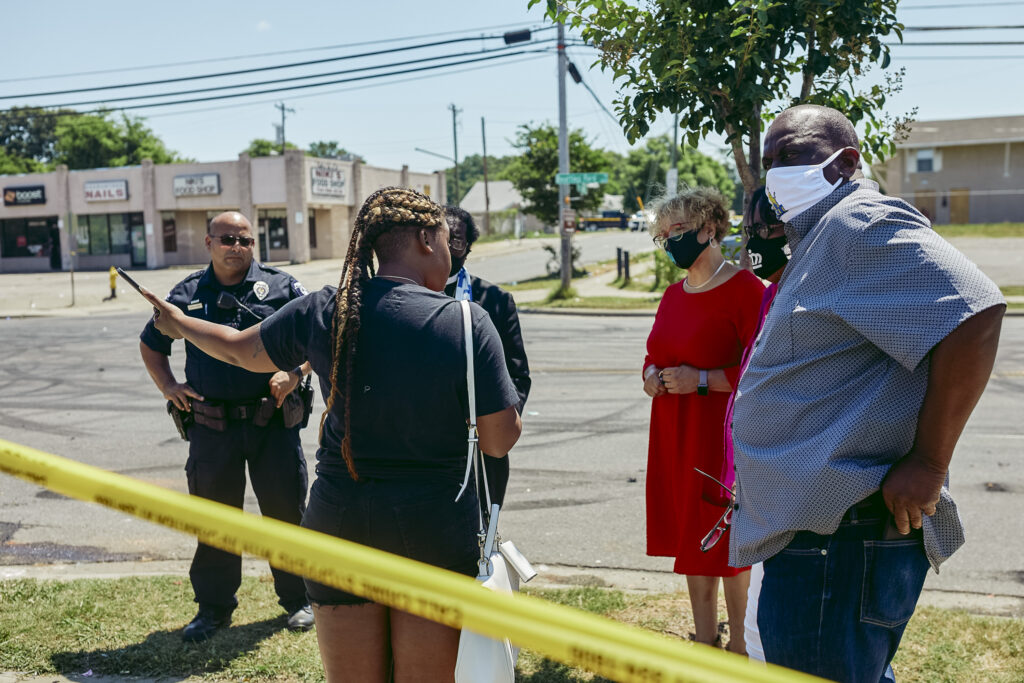
Few city council meetings were more emblematic of Lyles’ most recent term as mayor than one at the end of June, just before council’s July break.
That week, lobbyists and city officials were anxiously watching the legislature consider and vote on the Mecklenburg transportation bill. Years of work had gone into it, and they just needed to get through one last council meeting without a fire.
During the meeting, council member LaWana Mayfield proposed banning Teslas from the city’s list of approved electric vehicle vendors. Mayfield said she wanted to do it because of the company’s “instability,” WCNC reported, but council member Ed Driggs argued it was political and had more to do with controversial CEO Elon Musk.
City boosters watching from home worried that even having the conversation risked thrusting the local government into a national political debate at a time when Mecklenburg officials were trying to work with the Republican-led legislature.
Lyles knew the conversation was coming and tried to speed it along, regardless of how the vote went.
“I knew she was going to do it, and it was going to be OK, and we were going to get through it. … Besides, I have a Tesla,” Lyles told me. “I was just like, ‘Let’s get through this one really quick, please.’”
That’s part of her growth, she laughs. In her early days as mayor, she struggled to manage a mostly new and younger council. Meetings stretched for hours. Personal attacks became the norm in public discussion. In 2021, as former council member Tariq Bokhari sparred with current member Malcolm Graham, Lyles, at her wit’s end, shoved her chair out and called for a five-minute break.
Now, she says, she hopes to just keep the conversation moving forward. She also brought up another common critique of her handling of meetings and called it fair.
“Sometimes I get tired.”
“Tired?” I said.
“Yeah, tired. I’m at the dais, and they want to have this and that, and it’s what they need to do, and it’s okay. But sometimes it’s, it’s a little bit exhausting.”

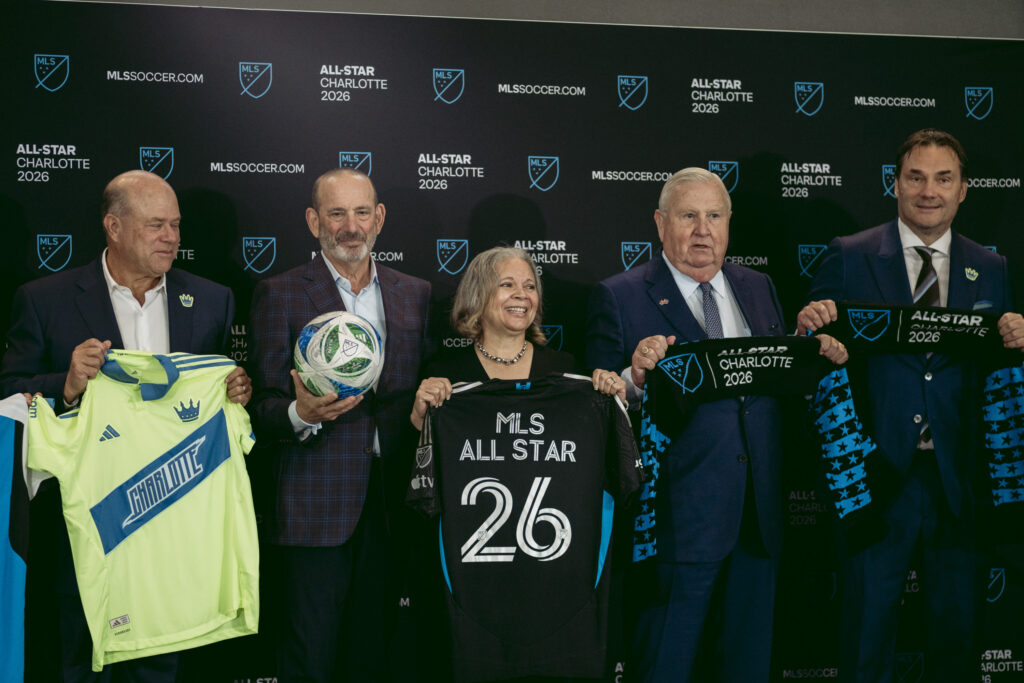
Lyles has a copy of the book Abundance on the coffee table in her office. She’s about halfway through.
The book, written by liberal journalists Ezra Klein and Derek Thompson, argues that the left needs to rethink its policies on zoning, permitting, and other bureaucratic hurdles to investment.
It’s caused Lyles to look back on her time as mayor and wonder where she’s fallen short on housing, transportation, and jobs. She now has the transportation measure in the hopper, and the city has created tens of thousands of jobs in her time as mayor, with several corporate investments announced just this month. But over the same time, Charlotte’s median home price jumped from about $280,000 to over $400,000.
“I remember my first race: I said that what was most important is that if you worked in Charlotte, you ought to be able to live in Charlotte,” Lyles said. “That has not proven to be true.”
So that’s part of what she has left to work on, if she’s elected again. She also hopes to finish the book soon, when she has time.
